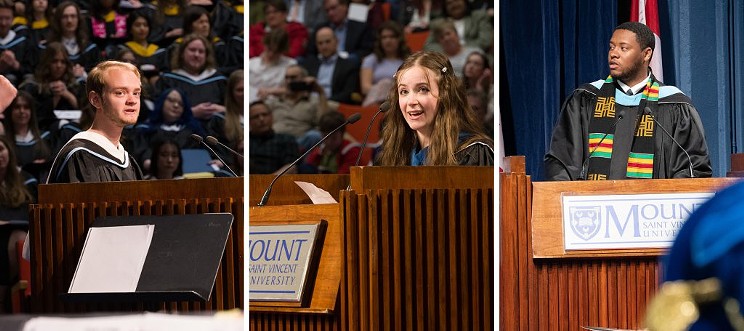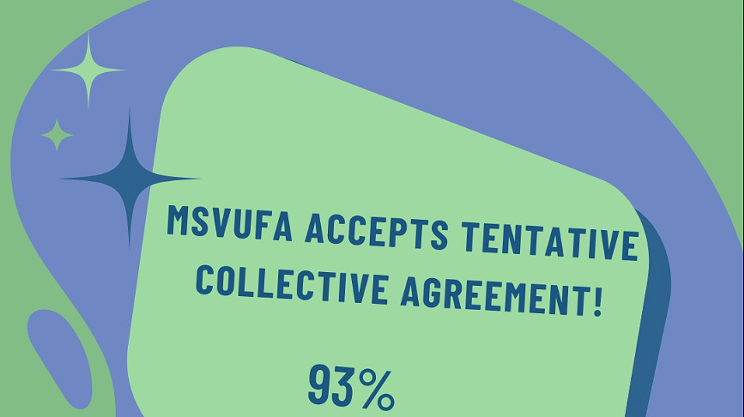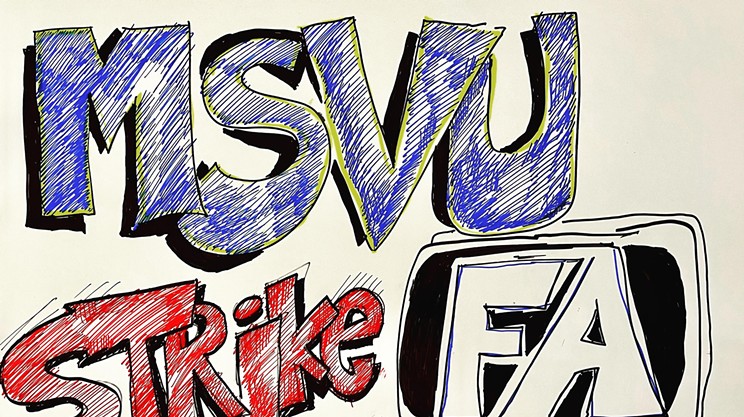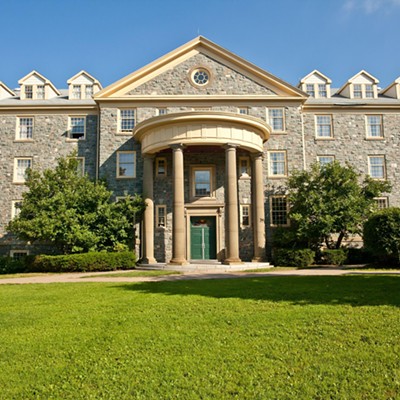Students returned to class at Mount Saint Vincent University on Thursday, Mar. 7 after faculty settled their three-plus week strike on Tuesday. The largest union at MSVU—representing 160 full-time faculty, lab technicians and librarians—returned to work on Wednesday, a day before students. But everyone had to wait until Friday evening, after the school’s senate met to decide on a plan, to learn that the term will not be extended to make up for the weeks without classes.
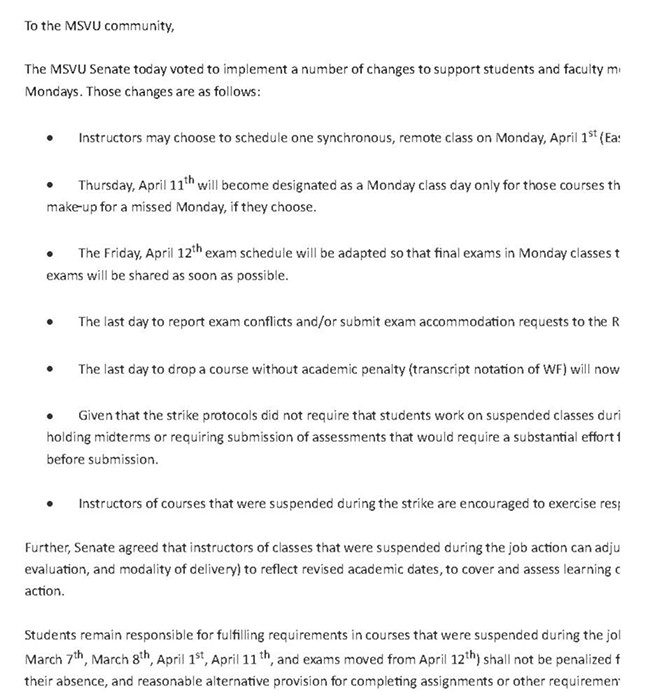
This first post-strike week begins with everyone picking up the pieces, figuring out how to adjust deadlines and curricula to be flexible with students’ needs, while faculty say a rift remains between them and their employer, despite both sides reaching an agreement to end the strike.
Background to a rift
Negotiations could have begun when the union filed a notice to bargain with their employer—MSVU’s Board of Governors—in May 2023. Their collective agreement was due to expire June 30, and it was a “roll-over agreement” stretching out the terms of their 2018-2021 agreement for another two years by way of a Memorandum of Agreement, “with limited modifications.” The faculty association agreed due to the COVID-19 pandemic requiring substantive flexibility. Therefore, 2023 was the first time the entire agreement could be modified since 2018. The two previous rounds of negotiations—in 2015 and 2018—began in June.
According to a complaint filed with Nova Scotia’s minister of labour on June 12, the MSVU Faculty Association’s lead negotiator, Geneviève Boulet, wrote to MSVU’s administration to ask for information related to various financial provisions of the collective agreement that would allow the union ample time to “analyze the cost implications of its proposals,” considering the agreement had sat still for five years without a major overhaul. Administration replied to Boulet saying the BoG would be “working on the request to have responses available at the commencement of bargaining.” But the commencement of bargaining was the subject of the complaint. The faculty union wanted to get going on the timetable that had worked in the past, while it seemed to the union that the board wasn’t preparing itself to stick to the typical timeline.
Apart from including a dean on their five-person bargaining team they knew would be away for two months that summer, the administration was dealing with other staffing issues. In April, MSVU announced the hiring of two new vice-presidents: Lori Francis as VP academic and provost to begin Aug.1 2023; and Isabelle Nault as the administration VP as of July 10. Neither would be on the BoG’s bargaining team, however they would be crucial members of the university’s advisory team, according to the BoG’s lead negotiator, Halifax lawyer Tara Erskine. Erskine wrote to Boulet after the hiring announcement, recommending bargaining begin once both new vice-presidents were onboard in the fall.
The faculty wasn’t happy with this, and requested a compromise: To present their agreement proposal to the BoG over the summer months; to agree to wait until both new administrators were hired as planned before expecting a counter-proposal to theirs from the BoG; and to therefore start with a leg up come September when both vice-presidents were onboard. The union delayed filing their notice to bargain—from May 1 until May 12—to give the BoG a chance to fill their bargaining team and to respond with possible dates to meet at the table. The BoG proposed dates in September, citing the need for both vice-presidents to be onboard for bargaining to begin.
Unhappy with the pace of the negotiations just to begin negotiating, the union filed its June labour complaint, hoping the province would tell MSVU’s BoG it had to start meeting with the union. But on Sep. 20, the labour board presented their unanimous decision to dismiss the complaint, boiling down the disagreement to a matter of convenience, saying “convenience, like a rose, lies in the eyes of the beholder.
“No doubt the employer could, if it thought best, have done what the faculty association insisted from its perspective was a more suitable approach (to appoint a different member of its team, and start negotiations before it could consult with senior administrations). But it was not for the faculty association—or any union—to dictate how an employer negotiates…so long as in doing so it makes every reasonable effort to reach an agreement.”
Fall negotiations
Negotiations broke down in September and October. The union felt that the BoG was acting in bad faith, aiming to further delay the bargaining process by not responding to their proposals and withholding information Boulet requested in February 2023.
The union filed for provincial conciliation to get the board back to the bargaining table; this request was approved in December and began in January. At that point, the union had voted for a strike if negotiations were to continue to break down, which they did, leading to the strike that began Feb. 12.
Another round of conciliation failed Feb. 26. On Saturday Mar. 2, both bargaining teams returned to the table and barely slept until an agreement was reached at 4am Tuesday, Mar. 5. Faculty were back at work the following day.
“It's amazing what happens when they actually read our proposals,” says Nathaniel Street, faculty spokesperson and tenured prof in MSVU’s English department. “It's very clear to me that the strategy from the beginning was to not negotiate, to not even read our proposals, to try to put us and our bargaining team in a compromised position and to wear us down. They only agreed to negotiate when they realized that they couldn't wear us down without hurting themselves more than they'd hurt us.”
Street credits the faculty’s bargaining team with working overtime to get the deal done, once they saw the university was finally ready to make a fair deal. “They basically sacrificed themselves to do that,” he says. “They put in this heroic effort.”
An agreement reached
The new agreement, which Street says they fought “tooth and nail to get,” includes a 3% salary increase for union members for each year of the three-year agreement. Street says this is “a good, reasonable raise—better than some, worse than others and roughly in line with our sister institutions—but that doesn't mean that we're brought into line with [the administration’s] pay. We’re still on the extreme lower end.”
Other additions in the new agreement include improved pregnancy leaves that benefit faculty no matter what time of year they happen in; domestic violence leaves that don’t disrupt tenureship lengths; and the addition of a land acknowledgement and clear and effective gender-neutral language.
Street says they didn’t get everything they wanted, but it’s a start. However, this process of bargaining puts an immense “personal emotional, physical, temporal, psychological toll specifically on our bargaining team.” And, except for the BoG’s desire to use a “scorched earth” strategy, it didn’t need to be this way.
“Look at the deal that we got,” says Street. “It’s a good, fair, reasonable deal, but it's certainly not the radical kind of thing that you would expect to get out of using major weapons like strikes.
“If the administration would have bargained in good faith from the beginning, then we should have gotten the exact same deal within a couple of months of work over the summer last year, and the total cost should have been… I don't know… a few shared meals?”
“This was a difficult time for all involved,” a spokesperson for MSVU’s administration wrote in an email to The Coast. “There was absolutely no intent by the board’s bargaining team to protract the process. In fact, the board’s bargaining team didn’t leave the bargaining table at any point in the negotiating process.
“Further, it’s of note that the MSVU Faculty Association tabled a significantly larger number of proposals in this round of bargaining than in previous rounds, which would obviously require more time at the table.”
A grievance unresolved
On Feb. 8, four days before the strike began, MSVU’s administration published strike protocols that included a pause of sabbaticals and sick-leaves previously issued to faculty. The update from MSVU administration reads in part: “Faculty members currently on sabbatical are not considered to be on a leave of absence; therefore, they will be considered as being on strike and subject to these protocols. Members on sabbatical whose research activities and/or location prevent their participation in strike action should contact the Vice President, Academic and Provost to request an exception.”
Street had his sabbatical paused for nearly a month, and says he’s lost all faith that the administration is willing to support his and others’ research. “If they just didn't exist, I would have been in a better position to do my research. The people who are supposed to facilitate me? They're active agents against me.”
But the administration says it invited faculty to apply for exemptions to cover any ongoing medical leaves and sabbaticals, so that instead of pausing these for the duration of the strike and returning that time afterward, they could continue during the strike. According to the administration, there were zero sabbatical exemption requests and two sick leave exemption requests—both of which were honoured.
“MSVU continues to strongly support faculty research,” says an administrative spokesperson in an email response to The Coast. “While no sabbatical exemptions were requested, many researchers submitted another form of strike protocol exemption request for continued access to campus and labs in order to continue their research. The vast majority of these requests were approved.”
The same day the administration published the strike protocols, the union filed a grievance with MSVU’s VP academic and provost, calling the discontinuation of sick leaves “particularly harsh,” saying they’re concerned the administration is trying to “intimidate members from participating in union business” and seeks “that every [association] member be made whole for any losses,” including of pay, benefits, and sabbatical time.
The administration confirms they’ve received the union's grievance and that it’s “moving through the usual internal process at this point.” It has not been concluded.
A litmus test for other faculty unions
The BoG hasn’t actually ratified the new agreement yet—a MSVU spokesperson says the board will meet soon to approve it—but that should only be a formality. Students and professors are back in classrooms, trying to salvage the term before the April 12 start of exams. And after the longest strike in The Mount’s history, university employees who were on opposite sides of a picket line last week are colleagues once again.
“MSVU administrators will continue to focus on fostering collegial and collaborative relationships with full-time faculty, librarians and lab instructors,” says the administration spokesperson.
Across Halifax, university faculty negotiations due for 2024 are just beginning. There are other unions heading into bargaining over new collective agreements this year, including another round at MSVU—for part-time faculty and teaching assistants—plus Dalhousie, Saint Mary’s, the University of King’s College and the Nova Scotia Community College, which might be holding their own strike Mar. 18.
MSVU faculty members say they held the line not just for themselves and their students but also for those other unions. Street worries that MSVU’s recent round of bargaining was, “in many ways, a litmus test for what academic labour relationships will look like in the future and what strategies the administrators learn works from this.
“How seriously do other universities have to live up to their own professed values? If the administration is successful here, it means that every other university feels that much more emboldened to profess something that they have no intention of substantiating and facilitating.”

